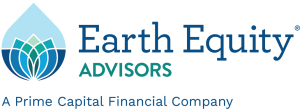What is Sustainable, Responsible, and Impact Investing?
It goes by many names: socially responsible investing, ethical investing, socially conscious investments, “green” investing, SRI, sustainable investing, and impact investing, but all of these approaches consider your financial return as well as social good to create a long-term positive impact.
Whatever name you call it, demand for socially responsible investments is growing and has been over many recent years. According to data supplied by US SIF (The Forum for Sustainable and Responsible Investing) there are nearly $13 trillion invested in some form of socially responsible investing. According to research conducted by Morgan Stanley in 2019, 85% of individual investors and 95% of millennial investors are interested in sustainable investing. And considering the social and environmental impact of your investment portfolio is increasingly seen as a wise approach. This same study showed 86% of investors agreed that environmental, social, and corporate governance (ESG) practices can potentially lead to higher profitability and may be better long-term investments.
Socially conscious investments can be made into individual businesses with a track record for social and environmental responsibility or into investment funds (including sustainable mutual funds, exchange-traded funds (ETF), or other types of SRI funds. Responsible investors do not ignore financial performance when making investment decisions, rather they and their financial advisors look at the potential for financial return while also considering the environmental and social impact those investments are likely to create.
At Earth Equity Advisors, our portfolios are grounded in solid fundamental economic analysis. We look at price/earnings ratios, debt levels, growth and other important metrics just like any “traditional” asset manager does. But, because we only invest with our values, we also incorporate enhanced socially and environmentally responsible due diligence.
My husband and I work hard to be good stewards of our natural resources. We garden organically, eat a mostly plant-based diet, conserve energy whenever possible, drive a fuel-efficient car, reduce our waste by recycling, and even compost. So when we accumulated enough wealth to invest, it made sense to do it with people who understood our ethics. When we found Earth Equity Advisors, a local company of like-minded people, we signed on. Peter Krull and his crew are tops in my book! They have been wonderful in helping us navigate complicated markets. I don’t have to worry about my investments because they do it for me, keeping an eye on trends and carefully researching every aspect of the investments they recommend. I appreciate our annual in-person visits, to check in and see how we’re doing. If you care about the earth we’re passing on to the next generation, then invest in earth-friendly and people-friendly companies – it’s one of the most important things you can do. – Katie B.
This testimonial was provided by a current client on June 27, 2021. The client was not compensated, nor are there material conflicts of interest that would affect the given testimony. The testimony may not be representative of the experience of other current clients and does not provide a guarantee of future performance success or similar services.
Approaches to SRI Investing
Sustainable Investing
Your retirement plans can be made in a socially responsible way. Sustainable investments are those made for positive long-term economic, social and environmental returns as well as for financial gains. Sustainable and responsible investing strategies can help you meet your financial goals in a way that won’t compromise your values.
Investing in Women and Girls
Gender lens investing is an investment approach that can create incredible social impact by improving the lives of women and girls. Gender lens impact investments often focus on community and economic developments that impact women as well as women-led businesses. The bottom line is that investments that improve the incomes and lives of women and girls can positively impact entire communities.
Fossil Fuel Divestment
We believe that the risk is too great to own fossil fuel extraction, processing or transportation companies because of issues such as extreme volatility in the petroleum markets, stranded assets and government regulation. More importantly, we do not want to own companies that, as journalist Bill McKibben says, “are willing to alter the chemical composition of the atmosphere in order to make more money.” We believe in doing the right thing!
Plus, a study from GMO Investment Management now shows that eliminating the energy sector does not negatively impact investment performance. In fact, a 2019 paper produced by The Institute for Energy Economics and Financial Analysis (IEEFA), an organization that conducts research and analysis on financial and economic issues related to energy and the environment, makes the financial case for divestment from fossil fuels.
Investing in Renewable Energy
Climate change is one of the biggest environmental concerns of our lifetime. Excluding fossil fuels from our portfolios frees up capital to support companies that have the potential to help solve the climate change crisis. Climate conscious investors can make an incredible impact by investing in renewable energy. Our fossil fuel free portfolios typically include investments in:
- Alternative energy
- Energy efficiency
- Water technology
- Natural & organic products and services
- Green real estate
- Technology, big data & internet of things
- Green finance
- Community investments
Portfolio Screening
There are two ways to screen a portfolio: positive and negative. Originally, SRI focused on negative screening, asking the question “what companies or sectors do we want to avoid?” It has evolved to include positive screening which asks the question “what do we want to own?” Earth Equity Advisors uses both techniques, but is proud to focus on the positive.
Responsible investing includes enhanced due diligence, including the screening of portfolios based on criteria including:
- Environmental track record & sustainability
- Corporate governance, business ethics & transparency
- Product safety
- Fair & safe workplaces (responsible business practices)
- International human rights
- Community involvement
Additionally, sustainable and responsible criteria help many socially responsible individuals, families and organizations invest in a way that aligns with their values.
Impact Investment
The Global Impact Investing Network (GIIN) defines impact investments as “investments made with the intention to generate positive, measurable social and environmental impact alongside a financial return.” These include a variety of investments in sustainable for-profit companies that are attempting to solve social and environmental challenges at scale. A growing number of impact investing opportunities are emerging across asset classes and sectors, including agriculture, renewable energy, microfinance, technology, construction, healthcare, and education.
History of SRI
Socially Responsible Investing has a long and storied history going back to religious investors who wanted to avoid investing in gambling and companies that produced alcohol. During the ’70s, the green movement integrated environmental awareness.
Traditionally, there are three primary SRI strategies:
- Portfolio Screening (which we’ve covered)
- Shareholder advocacy
- Community investing
Shareholder Advocacy
As a shareholder of a corporation, you have a voice in the selection of company leadership and to a limited extent, operational issues. This is accomplished by voting by proxy. Every year, corporations must hold shareholder meetings, and at these meetings, shareholders vote on a range of issues, including resolutions intended to influence company operations. While non-binding, when a vote on a resolution moves above 30% approval rating, it’s usually in management’s best interest to listen.
Shareholder resolutions filed over the past several years include:
- Corporate political activity including donations
- Climate change
- Labor & equal employment opportunity
- Executive pay
- Human rights
- Board diversity
- Sustainability reporting
Community Investing
The final leg of SRI is community investing. At Earth Equity Advisors, we use community reinvestment act notes which direct capital to underserved communities across the United States. This may result in much needed community development projects, low-income housing construction, job retraining programs or affordable healthcare programs. Most of these programs are domestic, but some are directed internationally as well.
Sustainable Portfolios
Each client portfolio is unique, based on their risk and return needs. We typically use a combination of one of our fossil fuel free diversified mutual fund models (conservative, balanced, aggressive or global equity), Calvert Impact Notes or managed individual equity models from our colleagues at Green Alpha Advisors. Many client portfolios include Earth Equity’s Signature fossil fuel free individual stock portfolio, The Green Sage Sustainability Portfolio.
Learn more about our Investment Philosophy.






